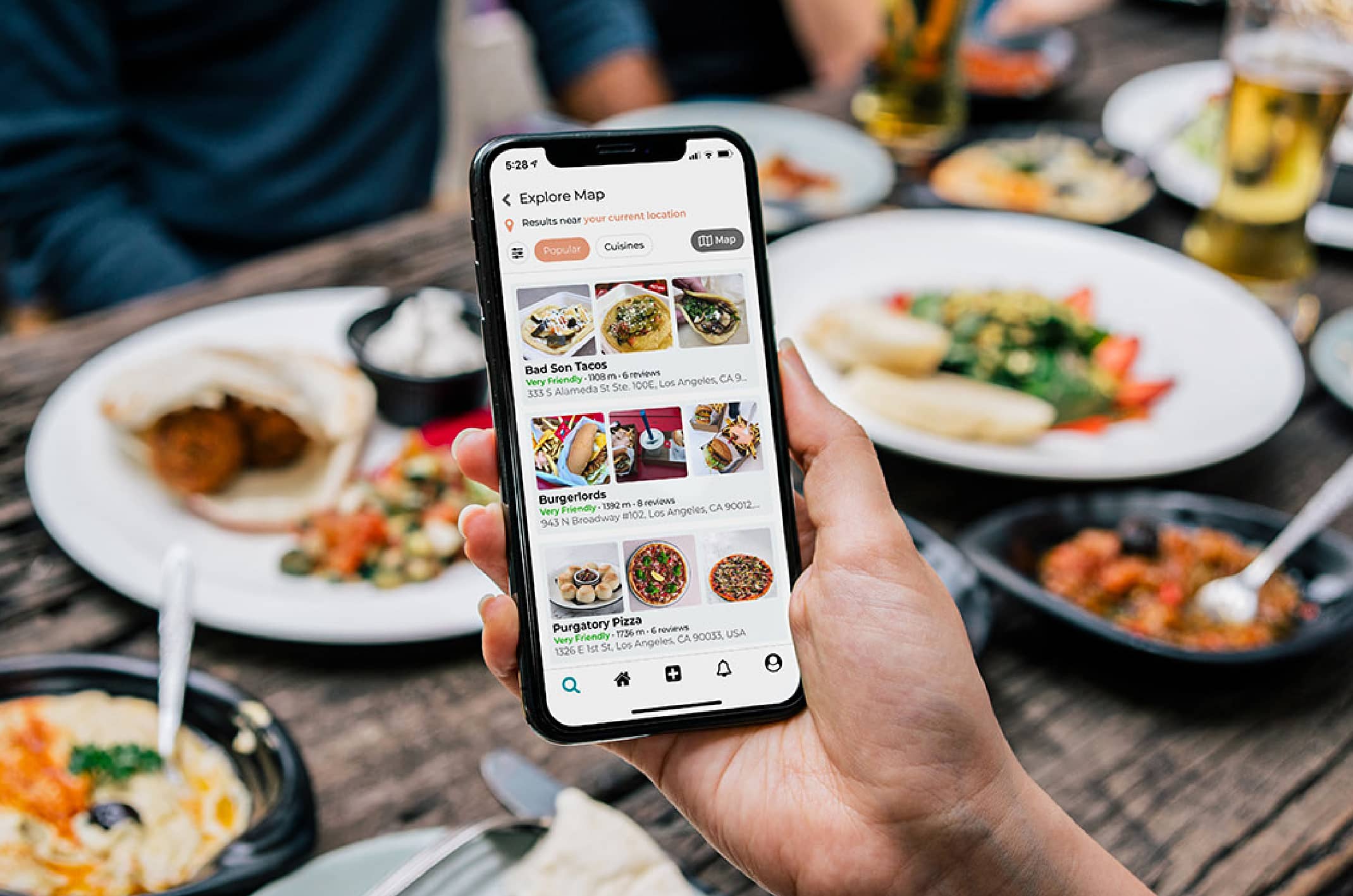Hello!
Search Engine Optimization (SEO) is an integral part of any online marketing strategy and can be particularly beneficial to restaurants. Optimizing your restaurant’s web presence in search engine results.
 This comprehensive guide will provide a thorough overview of SEO for restaurants, from keyword research to optimizing your web content, it covers everything.
This comprehensive guide will provide a thorough overview of SEO for restaurants, from keyword research to optimizing your web content, it covers everything.
SEO for restaurants is optimizing a website, using strategic keywords and content to increase visibility in organic search engine results.
This includes everything from researching relevant keywords and phrases that customers are searching for when looking for restaurants to setting up your website to optimize it with the appropriate keyword density.
As search engines become more sophisticated, so do the methods of improving organic visibility. When google search robots crawl your website, they look for certain criteria to determine where and how it should be ranked in the search results.
This means understanding restaurant SEO’s basics is essential to remain competitive in the online food market.
What are the Benefits of SEO for Restaurants?
Before optimizing your website for SEO, it is important to understand its benefits.
Increased Visibility
 SEO is a great way to increase your website’s visibility online and make it easier for potential customers to find you.
SEO is a great way to increase your website’s visibility online and make it easier for potential customers to find you.
When your website ranks higher in search engine results pages, it will be seen by more users.
This will lead to an increase in organic traffic and potential customers who can become loyal customers.
When a restaurant website is optimized for SEO, it increases the likelihood of customers finding them and choosing to visit. Search engine optimization can help businesses reach more customers and increase sales.
Improved Content Quality
SEO for restaurants also involves creating quality content tailored to an audience’s needs. By researching keywords and topics related to restaurants, you will be able to create informative, helpful, and engaging content.
Quality content is essential for restaurants because it can help build trust with potential customers and create a credible online presence. Additionally, quality content will make your website stand out from the competition and can lead to increased visibility in search engine results pages.
Increased Brand Awareness
 The benefits of SEO don’t end with increased traffic. Search Engine Optimization also helps to increase brand awareness. As customers search for keywords related to your restaurant, they’ll be exposed to your brand name and become familiar with it.
The benefits of SEO don’t end with increased traffic. Search Engine Optimization also helps to increase brand awareness. As customers search for keywords related to your restaurant, they’ll be exposed to your brand name and become familiar with it.
This is especially important if you have a unique or uncommon name that customers may not recognize otherwise. Additionally, when customers search for your restaurant by name, they’ll be able to find you more easily.
If done correctly, SEO can make it easier for potential customers to find and familiarize themselves with your restaurant. This familiarity makes them more comfortable when considering where to dine out. With increased brand awareness from SEO efforts, your restaurant will have an advantage over competitors.
Increased Customer Engagement
SEO can also help to increase customer engagement by enabling customers to easily find content related to your restaurant or reviews from other customers. Optimizing for keywords that relate to your restaurant will ensure that customers can receive information regarding your menu, specials and offers, and reviews from other customers.
 This will encourage customers to engage more with your restaurant by allowing them to find information about you online easily.
This will encourage customers to engage more with your restaurant by allowing them to find information about you online easily.
Further, having an active website optimized for SEO can lead to a better customer experience as they can easily access all of the information they need in one place.
This will greatly benefit your restaurant as customers are more likely to visit and dine with you if they know their needs and questions can be answered quickly and easily.Are you a restaurant owner
Tips to Do SEO for Restaurants
Now that you understand the importance of SEO for restaurants, here are some tips to help you get started.
Choose Relevant and Keyword-Rich Titles
Titles are one of the most important aspects of SEO for restaurants. They should include phrases that accurately describe your restaurant and food and terms people would use to find a similar eatery.
 Your titles should also include keywords for which you want to rank in search engine results. Make sure your titles are unique, relevant, and keyword-rich to maximize their SEO potential. When the search results appear, you want your restaurant to stand out above the competition.
Your titles should also include keywords for which you want to rank in search engine results. Make sure your titles are unique, relevant, and keyword-rich to maximize their SEO potential. When the search results appear, you want your restaurant to stand out above the competition.
Suppose you own an Italian restaurant; your titles could include keywords such as “authentic Italian cuisine” or “the best pasta in town.” Or even more specific terms like “Roman-style pizza” or “Spaghetti Bolognese.”
Write Content with High-Quality and Engaging Text
In addition to titles, you will also want to provide quality content that helps your website rank higher in search results. To do this, focus on creating engaging and informative content for your restaurant’s potential customers.
Ensure you include keywords throughout the text and in titles and headings to maximize SEO benefits. Plus, make sure to write in a conversational tone and avoid overly technical language or jargon that might confuse readers.
 Provide examples and visuals whenever appropriate, as this helps break up the text and makes it easier for your readers to digest. Finally, ensure that all your content is original and does not duplicate any other sites or pages.
Provide examples and visuals whenever appropriate, as this helps break up the text and makes it easier for your readers to digest. Finally, ensure that all your content is original and does not duplicate any other sites or pages.
Duplicate content can negatively impact your SEO rankings and may even lead to penalties from search engines. Writing high-quality and engaging content is essential to any successful SEO strategy.
With the right text, you can reach more customers, generate more interest in your restaurant, and ultimately increase your sales.
Optimize Images and Videos
Images and videos are also important elements of SEO for a restaurant business. Both help make your website more visually appealing while providing an opportunity to include additional keywords that may not fit into the text.
Whenever you upload an image, include relevant alt-text with the proper keywords. You should also compress images, so they are optimized for loading quickly, as this also helps with your website’s overall performance.
 Similarly, you should include a short video description when embedding videos and use keywords whenever possible. Additionally, ensure all images and videos are properly sized for maximum compatibility across different devices.
Similarly, you should include a short video description when embedding videos and use keywords whenever possible. Additionally, ensure all images and videos are properly sized for maximum compatibility across different devices.
Optimizing images and videos in addition to text content can ensure that your website is more appealing to both users and search engines alike.
Engage With Customers on Social Media
Social media is a great way to engage with potential customers and build relationships. An active presence on social media platforms like Facebook, Twitter, and Instagram can help boost your SEO ranking.
 Whenever you post content on these sites, be sure to include relevant keywords as hashtags that are related to the restaurant industry, such as “restaurant” or “dining out.” It would be best to link to your website whenever possible for more direct user engagement.
Whenever you post content on these sites, be sure to include relevant keywords as hashtags that are related to the restaurant industry, such as “restaurant” or “dining out.” It would be best to link to your website whenever possible for more direct user engagement.
Additionally, it’s important to respond quickly when customers leave reviews or ask questions so that they feel appreciated and continue patronizing your business in the future. By engaging with customers through social media, you can increase your visibility online and improve your SEO ranking.
Encourage Reviews & Testimonials
 Positive reviews and testimonials can be a great way to boost your SEO ranking. Encourage patrons to leave reviews on popular websites like Google My Business, Yelp, and Trip Advisor. These reviews will not only increase your restaurant’s visibility but also help build trust with potential customers by demonstrating that you have a loyal following.
Positive reviews and testimonials can be a great way to boost your SEO ranking. Encourage patrons to leave reviews on popular websites like Google My Business, Yelp, and Trip Advisor. These reviews will not only increase your restaurant’s visibility but also help build trust with potential customers by demonstrating that you have a loyal following.
Reposting customer photos or sharing positive comments about your business on social media is another great way to engage with customers and improve your rankings. By encouraging customers to leave reviews and boosting their content online, you can significantly impact your SEO rankings.
Usually, customers will consider 3rd party reviews more than your website. So focus more on getting good, honest reviews from trustworthy sources to ensure you rank high on google.
Utilize Local SEO Tactics
Local SEO tactics can be an effective way to reach out to local customers. To utilize these tactics, restaurants should list and optimize their business on major search engine indexes such as Google My Business and Yelp.
 Additionally, businesses can build content specific to the area or city in which they are located. This content could include articles about local events or attractions, blog posts about restaurant reviews from nearby customers, or local cuisine trends.
Additionally, businesses can build content specific to the area or city in which they are located. This content could include articles about local events or attractions, blog posts about restaurant reviews from nearby customers, or local cuisine trends.
Restaurants should also use geographic keywords on their website to indicate that their business provides services in a specified location and be sure to link back to related web pages within the restaurant’s website. When local SEO tactics are used correctly, restaurants can experience increased visibility and better rankings on major search engines.
Consider Content Localization
Content localization is an essential aspect of any successful SEO for restaurants campaign. This means the process of adapting a website’s content to the language, culture, and local market settings in a target country or region.
By catering to specific local audiences, restaurants can benefit from increased engagement and more organic search engine traffic. In some cases, webpages may be completely translated into different languages as part of this process.
 Regarding SEO for restaurants, content localization also includes optimizing content for localized keywords. For example, suppose you are targeting customers in France. In that case, you should ensure that your page titles and meta descriptions contain French-specific words such as “le menu du restaurant” instead of the English equivalent, “restaurant menu.”
Regarding SEO for restaurants, content localization also includes optimizing content for localized keywords. For example, suppose you are targeting customers in France. In that case, you should ensure that your page titles and meta descriptions contain French-specific words such as “le menu du restaurant” instead of the English equivalent, “restaurant menu.”
Furthermore, content should be tailored to the local audience in terms of imagery, style, and tone of voice.
This helps ensure that the page provides a more relevant experience to visitors, which can lead to higher rankings on search engine result pages.
Think Mobile First
A mobile-friendly website is no longer an option in today’s digital world – it’s a must. Google now considers mobile-friendliness as one of its primary ranking factors. As such, owners must optimize their restaurant websites for desktop and mobile devices to maximize visibility on search engine result pages.
In online ordering, for example, customers should be able to quickly and easily find the menu items they are looking for.
 When optimizing for mobile devices, it is important to consider user experience first. This means ensuring that all content (including images and videos), navigation structure, and page loading times are optimized to cater to smaller screens and slower internet speeds.
When optimizing for mobile devices, it is important to consider user experience first. This means ensuring that all content (including images and videos), navigation structure, and page loading times are optimized to cater to smaller screens and slower internet speeds.
Additionally, ensure that the website includes clickable phone numbers or links to call or message the restaurant directly from any device so users can quickly and easily contact the restaurant.
By optimizing for mobile, restaurants can increase visibility and engagement on search engine result pages and provide users with a better experience overall. Plus, local searches on mobile devices often lead to higher click-through rates.
Implement Schema “Restaurants” Markup
Schema “Restaurants” markup is becoming increasingly important for SEO for restaurants. Marketing a restaurant this way sounds more complicated than it actually is. This structured data allows search engines to understand a website’s content better and display relevant SERP results.
 By implementing this markup, restaurants can benefit from rich snippets, which can be used to further improve visibility on search engine result pages and drive more organic traffic. When other search engines like Yahoo and Bing crawl a site, the markup can also help ensure that the most accurate information is displayed in the SERP.
By implementing this markup, restaurants can benefit from rich snippets, which can be used to further improve visibility on search engine result pages and drive more organic traffic. When other search engines like Yahoo and Bing crawl a site, the markup can also help ensure that the most accurate information is displayed in the SERP.
When creating the schema “Restaurants” markup, it is important to include all necessary information such as address and contact details, menu items (including prices), opening hours, photos, ratings, and reviews.
Including this information will help ensure that customers are provided with all the necessary details when visiting your website or searching for your restaurant online.
It will also help search engines better understand and index your website’s content which can lead to higher rankings on SERPs. The google maps integration tool can help to make the process of creating and implementing the markup easier.
Track Performance with Analytical Tools
 Finally, you should track the performance of your website using analytical tools such as Google Analytics and other third-party services. This will give you an idea of how many visitors visit your page, which keywords they are searching for, and other important data points.
Finally, you should track the performance of your website using analytical tools such as Google Analytics and other third-party services. This will give you an idea of how many visitors visit your page, which keywords they are searching for, and other important data points.
Using this information, you can adjust your SEO strategies accordingly and make changes to improve your ranking. Tracking performance is important in understanding how well your SEO efforts are paying off, so it should not be overlooked.
By using analytical tools to monitor your website’s success, you can ensure that your SEO campaigns are as effective as possible.
Also read:
- 4K Video Downloader Review: Why It Is The Choice Of 11+ Million Users?
- 7 Safety Tips On Online Money Transfer
- The Future of Recruitment
Closing Thoughts About Implementing SEO for Restaurants
 SEO for restaurants is an ongoing process that requires effort and patience. However, implementing the strategies outlined in this comprehensive guide can help you to improve your visibility on search engine result pages and drive more organic traffic to your restaurant website.
SEO for restaurants is an ongoing process that requires effort and patience. However, implementing the strategies outlined in this comprehensive guide can help you to improve your visibility on search engine result pages and drive more organic traffic to your restaurant website.
Optimizing content for local audiences, ensuring a mobile-friendly design, implementing schema “Restaurants” markup, and tracking performance using analytical tools can give your restaurant the best chance of success. With that said, SEO is not a “set it and forget it” endeavor – you must continuously monitor the performance of your website and adjust strategies as needed to ensure maximum visibility.
By staying on top of your SEO efforts in this way, you can give your restaurant the best chance of success.
Thank you!
Join us on social media!
See you!






